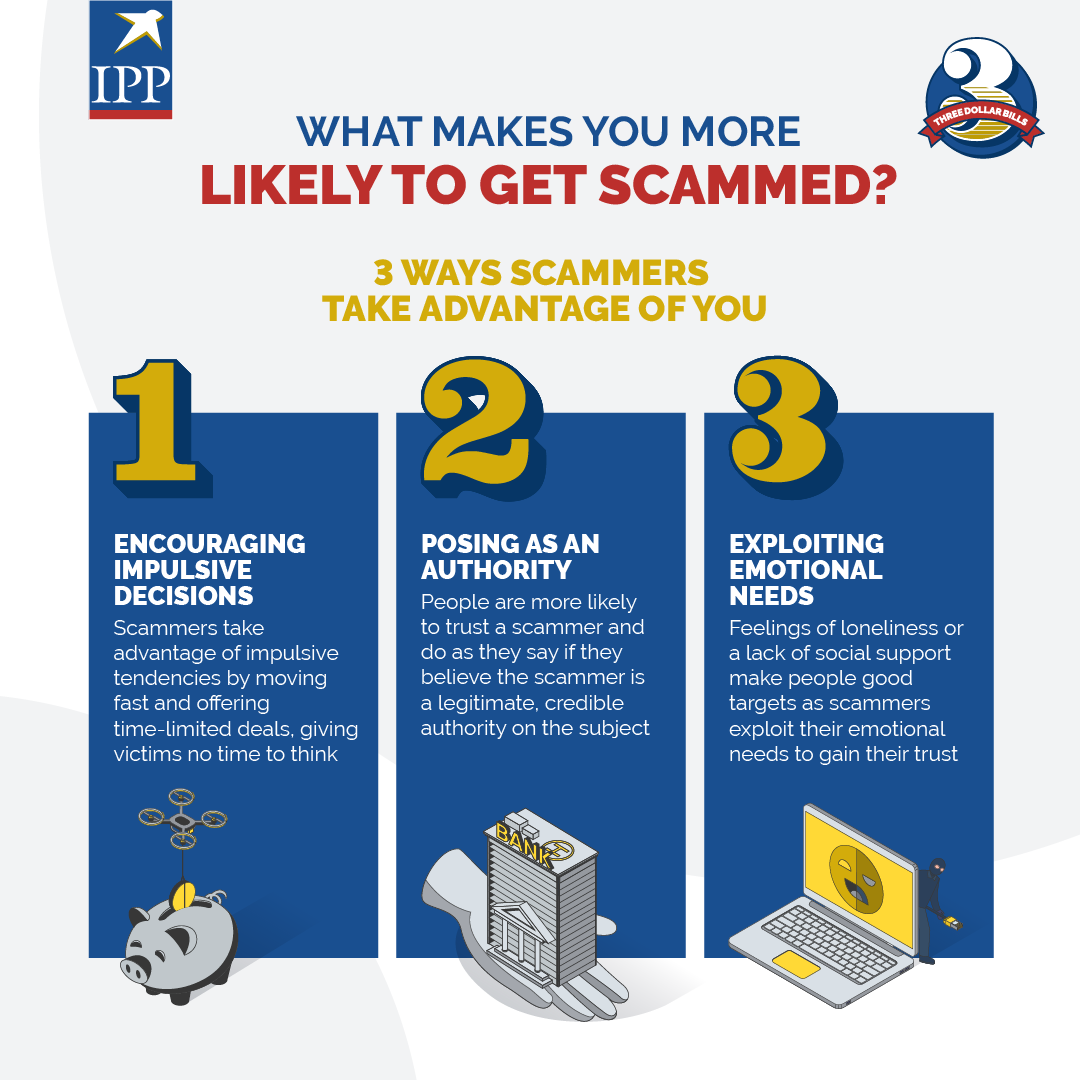
3 Ways Scammers Take Advantage
Anyone can fall victim to a scam, even if you’re on the lookout for it.
Maybe you’ve heard this sentence before, but today we’ll break down what makes people inherently susceptible to scams, and what you can do to minimise the chances of falling for one yourself. A saying has been going around recently: there is no unscammable victim, only the wrong type of scam. Some people might believe that only gullible or naive people will fall for scams, but even the most sceptical, scam-alert person can fall victim to scams.
When trying to answer the question “who is more likely to fall for scams, and why?” research results have been mixed. Some studies concluded that older people are more susceptible to scams while others report that younger people are. Some studies show that people who don’t open their emails often are more susceptible, yet others show that those who do reply frequently are more likely to be victims. With such contradicting evidence, it would seem like the saying is right after all.
Different strokes for different folks
Romance scams might target people who are feeling lonely, while “free gift” scams work better on those on a budget. The mixed research results demonstrate as much: older people may not be as scam literate or technologically savvy, and thus more likely to fall for scams, while youngsters spend so much of their time online that they are constantly bombarded by it, and eventually one or two fall through the cracks. Rather than saying that certain demographics are more likely to be scam victims than others, it would be more accurate to say that different demographics have different sets of vulnerabilities that scammers can exploit.
With that being said, there are some risk factors that keep coming up. Here are some of the most common ones, and what you can do to guard against them.
Time limits and impulsiveness
Putting a timer on limited deals is a marketing strategy widely used, from online shops to hotel booking websites. Scammers make use of this tactic too, and it is a particularly effective one. This can be especially effective on people who tend to “act first, think later”. By the time the victim has slowed down to think things through, it might be too late. Remember: if you’re not sure about the deal, you can always walk away and come back later. And if you can’t, maybe the deal wasn’t so good after all.
Illusions of legitimacy
Multiple studies have shown that people are more likely to trust and comply with someone if they believe that the person’s background is credible or authoritative. This is why scammers often go out of their way to spoof real websites, and why the “China official” scam works so well. Combined with the tactic of using time limits, it creates a perfect scenario to trap unsuspecting victims. Although requiring a bit of effort, the best solution is always to do your own background checks to verify if people really are who they say they are.
Emotional connections
People with depression, experiencing loneliness, or lacking in social support make good targets as scammers take advantage of their emotional needs to build a relationship with them, with the eventual goal of convincing victims to part with their money. The most prevalent of these is, of course, the romance scam. In such cases, it can be incredibly difficult to convince a victim that they have been scammed, as the scammer is often filling an emotional need that the people around the victim are not, and the victim is thus more inclined to trust the scammer over everyone else. Reach out to your friends or family once in a while to check in on them. Picking up a new hobby can also be a great way to learn new skills and meet new people, expanding your social circle and connecting you with a supportive community of fellow hobbyists.
Conclusion
At the end of the day, the best way to guard against scams is always to do your due diligence before handing anyone your money or personal details. Other times, getting a second opinion might be the wake-up call you need. Familiarising yourself with common red flags or different scam types can also make it easier to identify a scam when it happens. While it won’t be possible to become fully bulletproof, understanding more about what makes us tick will help you – and those around you – spot a scam, before it’s too late.

“This advertisement has not been reviewed by the Monetary Authority of Singapore”
Disclaimer: Investments have investment risk. Past performance is not necessarily indicative of the future performance of an investment. Please seek advice from a Financial Adviser Representative before making any investment decisions.
IPP Financial Advisers Pte Ltd
78 Shenton Way #30-01 Singapore 079120 | Tel: +65 6511 8888 | enquiry@ippfa.com |
IPP Financial Advisers Pte Ltd
78 Shenton Way #30-01 Singapore 079120
Tel: +65 6511 8888 | enquiry@ippfa.com
